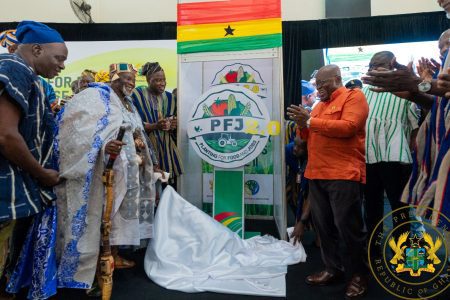President Nana Addo Dankwa Akufo-Addo, has launched PFJ Phase Two of Government’s flagship programme on agriculture, “Planting for Food and Jobs”, at the University for Development Studies, in Tamale.
Targeted at building on the successes of the initial programme, the second phase of the programme is a five-year master plan for the transformation of agriculture in Ghana with focus on modernisation through the development of a selected commodity value chain and active private sector participation.
Phase II of the PFJ, anchored on an input credit system, will provide affordable and timely credit designed to meet farmers’ needs, replacing the input subsidy under the first phase.
Launching the initiative, President Akufo-Addo stated that the second phase, by design, “takes a holistic view and places greater emphasis on value chain approaches by focusing on strengthening linkages between actors along eleven selected agricultural commodity value chains broadly categorised into grains, roots and tuber, vegetables and poultry.”
He added that Phase Two of the Programme also seeks to improve service delivery to maximise impact, and substitutes direct input subsidy with smart agricultural financial support in the form of comprehensive input credit, with provision for in-kind payment.
The President disclosed further that key elements of the new phase also include an input credit system that provides farmers with access to inputs such as seeds, fertilizers and pesticides and other support services for improving productivity and yield as well as storage infrastructure and logistic hub to improve storage and distribution of produce to reduce post-harvest losses.
It also includes off-taker arrangements/commodity trading to improve farmer access to markets which guarantees fair prices for crops; and a digitised platform for management, monitoring and coordination to improve efficiency and effectiveness of the programme.
“The impact of the Programme is expected to be in the area of job creation, with some 1.2 million farmers to be enrolled in the first year.
210,000 new farm-related jobs
“In the next four years, the Programme is destined to record an annual average of 210,000 new farm-related jobs.
“This will exclude other jobs along the agricultural value chains estimated at an annual average of four hundred and twenty thousand over the same period,” President Akufo-Addo said.
It will be recalled that, On Wednesday, April i9, 2017, President Akufo-Addo launched the maiden “Planting for Food and Jobs” programme at Goaso in the Ahafo region to represent government’s key initiative to modernise agriculture, improve production efficiency, achieve food security, and profitability for our farmers.
It summarily targeted a significant increase in agricultural productivity and pursued a value-addition strategy, aimed at rapidly ramping up agro-processing and developing new and stable markets.
Achievements of PFJ phase one
The President noted that, the successful implementation of the first phase has resulted in reaching over 2.7 million farmers and other value chain actors under the five modules, a relatively stable food security environment with food self-sufficiency in major food staples such as maize, cassava and yam and an increased agricultural sector growth rate from 2.7% in 2016 to an average of 6.3% from 2017 to 2021.
According to him, as a result of this, “Government has, thus, been able to achieve the annual target of six percent of sector growth, set under the Malabo Declaration to which Ghana is a signatory, increased fertilizer application rate from eight kilogrammes per hectare in 2016 to twenty-five kilogrammes per hectare in 2022, an increased distribution of certified seeds from two thousand metric tons in 2016 to thirty-six thousand metric tons in 2022 and an increased private sector investment in the seed industry.”
According to him, PFJ phase one resulted in an achievement of nearly 50% self-sufficiency in rice in 2022, down from 29.1% in 2016.
The President was happy to disclose that, “a recent Summit, organised by the United Nations on the need to build country food systems in September 2021 in New York and at the AU Dakar II Summit in January 2022, underscored the need for the review of strategies for delivering solutions to challenges in the agricultural sector” as such “it is praise-worthy that Ghana has responded to the call to action at both Summits by rolling out the Second Phase of the PFJ Programme.”
“I continue to give you my pledge that farmers, food crop farmers, fish farmers and livestock farmers will all have the support and respect they deserve from my government. We need to raise agriculture to a higher plane to be able to improve on the quality of life for our people,” he assured”.
Dr Bryan Acheampong, Minister for Food and Agriculture, said the focus on the selected grains, roots and tubers, vegetables, and poultry did not mean that other crops and livestock would be abandoned.
He said development partners would also align their projects in line with the principles of the new PFJ.
Ya-Na Abukari (II), Overlord of Dagbon said Phase One of the PFJ impacted positively, especially on the rice sector in the region and expressed hope that the new phase would also impact positively on the input sector.
Nana Yaw Sarpong Siriboe, 2022 National Best Farmer, thanked the government for the many initiatives to enhance the lives of farmers and ensure food security in the country.
He said the PFJ had made farming attractive to the youth and pledged the support of farmers for the successful implementation of Phase Two of the PFJ.
- GMA furious over suspension of duty waiver on vehicles - 3 April 2025
- Thursday, April 3, 2025 Newspaper Headlines - 3 April 2025
- Trump slaps tariffs: Ghana, UK-10%, EU-20%, others-50% - 2 April 2025

